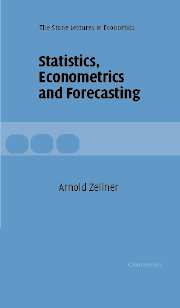Lecture 2 - National Institute of Economic and Social Research
Published online by Cambridge University Press: 22 September 2009
Summary
The National Institute of Economic and Social Research is an independent educational charity, founded in 1938. It conducts research on a wide variety of topics, but has a particular interest in economic modeling, investment and productivity, labour market issues and vocational education and training. All research projects are designed to contribute to the public debate on the issues they address. The Institute has its own research staff based in central London, and works in cooperation with universities, industry and other bodies. It is independent of UK government and receives no core funding from public or private sources.
The Institute aims to promote, through quantitative research, a deeper understanding of the interaction of economic and social forces that affect people's lives, in order that they may be improved. Its main function is to produce research suitable for publication through academic channels, and hence findings from the Institute's work are published widely in academic journals and elsewhere. They often find an outlet in the Institute's own quarterly Economic Review, which is available on subscription or individually. Discussion Papers dealing with work in progress, and Occasional Papers on specific topics, are also issued from time to time. Results from major pieces of research often lead to books, published through commercial publishers. In addition, the NIESR holds conferences each year, which provide an opportunity to hear about research findings and debate them with interested organisations and individuals.
- Type
- Chapter
- Information
- Statistics, Econometrics and Forecasting , pp. 79 - 124Publisher: Cambridge University PressPrint publication year: 2004

